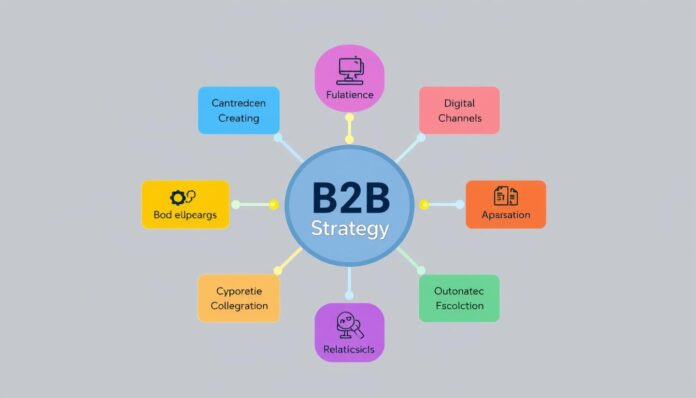Imagine walking into a bustling trade show where hundreds of businesses compete for attention. You see sleek booths, eye-catching graphics, and sales personnel eagerly pitching their products. Before they even arrive, a complex web of interactions sets the stage.
This is what a B2B marketing strategy framework is all about. It’s a vital plan that helps businesses connect with their targets. In today’s fast-paced digital world, having a product isn’t enough. You must find and reach your customers to boost visibility, get quality leads, and drive sales.
This guide will show you why a solid marketing strategy is key. It’s about how you connect with clients in a meaningful way.
Table of Contents
Key Takeaways
- A structured approach is essential for creating a successful B2B marketing strategy framework.
- Understanding your target audience improves engagement and conversion rates.
- Multiple marketing channels can enhance visibility and reach.
- Measurable objectives help track progress and success in your marketing efforts.
- Creating buyer personas enables more tailored marketing messaging.
- Evaluating digital assets ensures they align with your overall marketing goals.
- Utilising data-driven strategies can significantly improve lead quality and acquisition costs.
Understanding Your Target Audience
Knowing your target audience is key to a good B2B marketing plan. You need to understand their sectors, problems, and who makes the buying decisions. Making detailed buyer personas is vital. They show who your ideal customers are, based on who they are, their challenges, and how they make decisions.
Creating Buyer Personas
To meet your market’s needs, create detailed buyer personas. These profiles give a deep look at who’s important in buying decisions. Think about:
- Demographics
- Key challenges and pain points
- Decision-making criteria
- Budget constraints
- Preferred communication channels
Defining Your Ideal Customer Profile (ICP)
Creating your ideal customer profile helps focus on valuable clients. By sorting clients by industry, size, and location, you target better. This makes your marketing hit the mark with those most likely to buy. Learning about financial planning can also help spot future partners.
Identifying Decision-Makers
Finding out who makes the buying decisions is essential for B2B marketing success. By focusing on those with the power to buy, your marketing gets more precise. Getting feedback from current clients through surveys can give great insights. Also, understanding the buyer’s journey helps tailor your approach to these key people.
Developing a B2B Marketing Strategy Framework
Creating a strong b2b marketing strategy framework is key for businesses to thrive. It helps streamline operations and align activities with the company’s goals. This section will look at why a structured framework is important and what components are needed for success.
Importance of a Structured Approach
A clear marketing strategy gives direction to your efforts. It helps spot key market chances and meet customer needs. For instance, companies like EBQ have seen a huge jump in leads, over 1000% in some cases. This shows how a good marketing framework can drive growth.
Components of a Successful Framework
The key parts of a successful marketing framework include:
- Market Analysis: Knowing what customers need helps you see how your product or service fits.
- Goal Setting: Setting SMART goals is the first step to track and measure success.
- Ideal Customer Profile (ICP): Knowing your ICP helps focus on the right decision-makers.
- Buyer Personas: Creating profiles based on real data helps address buyer challenges.
- Content Strategy: Making content that speaks to your audience is vital for marketing.
- Data-Driven Decisions: Using analytics to guide decisions boosts lead generation and conversion.
Using these components creates a clear plan for executing and measuring your marketing strategy. A solid foundation is essential for building a strong brand and improving customer relationships. Good data from market analysis ensures your content resonates, boosting your online presence and conversion rates.
For more insights, check out effective goal-setting strategies to boost your B2B marketing.
| Component | Purpose | Outcome |
|---|---|---|
| Market Analysis | Identify needs and opportunities | Better alignment with customer preferences |
| Goal Setting | Define measurable objectives | Clear direction and focus |
| ICP | Target key accounts | Improved engagement with decision-makers |
| Buyer Personas | Understand buyer motivations | Effective marketing messaging |
| Content Strategy | Create valuable content | Higher lead generation |
| Data-Driven Decisions | Inform strategy adjustments | Enhanced performance and ROI |
Leveraging Different Marketing Channels
Using a variety of marketing channels is key for B2B businesses. These different ways help you reach more people and connect better with them. Each channel has its own strengths, making your strategy stronger.
The Role of Content Marketing
Content marketing is vital for B2B success. It involves creating useful stuff like white papers and blog posts. This content informs and shows your brand’s expertise.
Good content solves problems for your audience. It helps build strong connections with them.
Utilising Social Media and SEO
Social media is great for B2B. It lets you connect with businesses and leaders. Sites like LinkedIn are perfect for networking.
Using SEO and PPC together boosts your online presence. This brings more people to your site and helps get leads.
Email Marketing Tactics
Email marketing is essential for B2B. It helps keep leads engaged and current customers happy. Personalised emails offer valuable info and special deals.
This approach strengthens your bond with customers. It also leads to more business and word-of-mouth.
| Marketing Channel | Key Benefits | Ideal For |
|---|---|---|
| Content Marketing | Builds authority, engages audience | Educating prospects |
| Social Media | Network and connect with professionals | Brand awareness |
| SEO & PPC | Increases visibility and traffic | Lead generation |
| Email Marketing | Nurtures leads, fosters relationships | Customer retention |
Marketing Strategy Implementation for B2B
A successful B2B marketing strategy starts with a detailed marketing plan. This plan must align with your business goals. It should have clear objectives and KPIs to track progress.
Knowing your target market is key. So, make marketing plans that focus on your audience. This will boost your outreach efforts.
Creating a Marketing Plan
Creating a marketing plan means setting goals and choosing how to reach them. It should outline your targeting and positioning strategies. This ensures you connect with the right people.
Studies show firms that study their prospects grow faster. Here are steps for your marketing plan:
- Set SMART Goals: Goals should be Specific, Measurable, Achievable, Relevant, and Time-bound.
- Define Your Audience: Use personas to understand their needs and tailor your message.
- Choose the Right Channels: Use social media, SEO, and content marketing to reach more people.
- Implement Tracking Mechanisms: Use KPIs to see how well your efforts are doing.
Building a Dedicated Marketing Team
A dedicated B2B marketing team is essential for success. It should have experts like content marketers and data analysts. This team works together to achieve your goals.
Working with sales teams is important for a unified effort. Good communication between departments is key. The right team can increase conversions and keep customers.
B2B Marketing Strategy Framework
A good B2B marketing strategy has key parts that help businesses market well. Knowing these parts helps you make campaigns that speak to your audience and get results.
Key Elements of the Framework
The framework includes important parts like market segmentation and precise targeting. It also has creating compelling messages. Understanding buyer personas helps you know what your customers want.
Doing a deep competitor analysis shows your unique spot in the market. This way, you can target the right people and run campaigns that improve the customer experience.
Measuring Success with KPIs
Success in B2B marketing is measured with KPIs that show how well your campaigns work. Important metrics include lead generation rates and the ROI of marketing channels. These numbers help you tweak your strategies for better results.
By always checking these metrics, you can keep improving and stay ahead in the market. For more tips on marketing, check out marketing strategy guides.
Conclusion
An effective B2B marketing strategy framework is like a roadmap. It helps engage clients and grow your business. By knowing your audience and using B2B marketing strategies tailored for them, you can make a big impact. This is true for content, videos, or emails.
It’s important to keep an eye on how well your marketing is doing. Look at website traffic, how many people convert, and how much it costs to get new customers. This helps you make your marketing better over time. Using a good B2B marketing framework keeps you focused on your goals.
Start by knowing who you’re marketing to and who your competitors are. This is the first step to success in B2B marketing. As you work through the challenges, using these frameworks and tracking your progress will help you grow and build strong client relationships.
FAQ
What is a B2B marketing strategy framework?
A B2B marketing strategy framework is a detailed guide for businesses to connect with other companies. It helps in planning how to find and reach out to customers. This approach boosts visibility and sales.
Why is understanding my target audience important in B2B marketing?
Knowing your target audience is key for good B2B marketing. By making buyer personas and an Ideal Customer Profile (ICP), you can target the right customers. This ensures you’re marketing to the right people in businesses.
What are the key components of a successful B2B marketing strategy framework?
Important parts include market analysis, setting goals, and custom marketing plans. A framework helps understand the market and makes operations smoother. It helps reach your marketing goals.
How can I leverage different marketing channels in B2B?
You can use many marketing channels in B2B. Content marketing shows your expertise, social media like LinkedIn connects you with clients, and email marketing nurtures leads. Each channel is important for reaching your audience.
What does implementing a B2B marketing strategy involve?
Implementing a B2B marketing strategy means making a detailed marketing plan. You need to set goals and KPIs, and have a dedicated marketing team. This ensures your strategy works well and everyone works together.
How do I measure the success of my B2B marketing strategy?
Success can be measured with KPIs that show how well your marketing works. By checking these regularly, you can see what’s working and what needs improvement. This helps keep your marketing strong in the B2B world.





